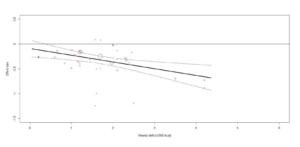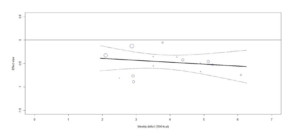In this blog article we explain the findings of our recent meta-analysis where we compared the effects of exercise and caloric restriction for reducing visceral fat in individuals with overweight and obesity.
Why is this study important?
Obesity is a growing global public health concern, with 39% of adults being overweight and 13% being obese worldwide (1). Obesity management guidelines have been designed to promote lifestyle strategies including exercise and caloric restriction to reduce the body mass index (BMI) of individuals with obesity.
While BMI can provide a valid and easy estimate of metabolic health, it does not allow to distinguish between subcutaneous and visceral fat. Visceral fat represents a far greater metabolic risk than subcutaneous fat (2). Consequently, BMI may not fully reflect the risk of cardiometabolic diseases, as it cannot discern individual variability in fat deposition.
How did the study go about this?
In this study, we compared the effects of exercise versus the effects of caloric restriction for reducing visceral fat in individuals with overweight and obesity. Exercise causes fat loss via an increase in energy expenditure, while caloric restriction results in fat loss via a decrease in energy intake. To ensure that an accurate comparison was conducted, we used weekly caloric deficit to control for the overall effects of the two interventions.
We conducted an extensive literature review and searched for studies where individuals with overweight and/or obesity were randomly assigned to an exercise or caloric restriction intervention, or to a control condition that involved no changes in energy expenditure and intake. We extracted the relevant data from the eligible studies and compared the extent to which exercise and caloric restriction reduced visceral fat, as measured by magnetic resonance imaging or computed tomography, which are the most accurate approaches for assessing visceral adiposity. We performed a quality assessment of the included studies and conducted stringent statistical analyses to ensure that our findings were accurate and rigorously obtained.
What did the study find?
Overall, we collected data from 40 studies involving 2190 individuals. While both exercise and caloric restriction effectively reduced visceral fat, only exercise demonstrated a dose-response relationship (see Figures 1 and 2), showing that increasing amounts of exercise result in greater visceral fat loss. The effect of caloric restriction was not dose-dependent, suggesting that greater caloric deficits do not necessarily translate into greater visceral fat loss.
Figure 1: Dose-response effects of exercise studies on visceral fat:

Figure 2: Dose-response effects of caloric restriction studies on visceral fat:

What are the key take-home points?
Our results suggest that increasing amounts of exercise translate into greater reductions in visceral fat in people with overweight and/or obesity than caloric restriction. While caloric restriction can also effectively reduce fat, a dose-response relationship was not present. Despite both interventions achieving fat loss via a negative energy balance, there seem to be some inherent differences between exercise and caloric restriction. One theory is that a substantial loss of body weight via diet would also result in a loss of muscle mass and this would then decrease the basal metabolic rate. A lower metabolic rate would then require a further reduction in calories for weight loss and this would be self-perpetuating. In contrast, exercise-induced fat loss might be achievable while preserving muscle mass.
Overall, our findings substantiate the role of exercise for metabolic health improvements, and support the use of exercise for reducing visceral fat in individuals with overweight and/or obesity. Further research is needed to confirm the effects of caloric restriction on visceral fat.
Authors:
Francesco Recchia, Chit K Leung, Angus P Yu, Welton Leung, Danny J Yu, Daniel Y Fong, David Montero, Chi-Ho Lee, Stephan HS Wong, and Parco M Siu.
References
- World Health Organization. Obesity and overweight [Fact sheet] 2021.
- Després JP, Cartier A, Côté M, et al. The concept of cardiometabolic risk: Bridging the fields of diabetology and cardiology. Ann Med 2008;40(7):514-23.